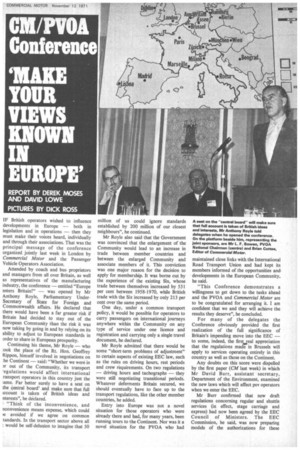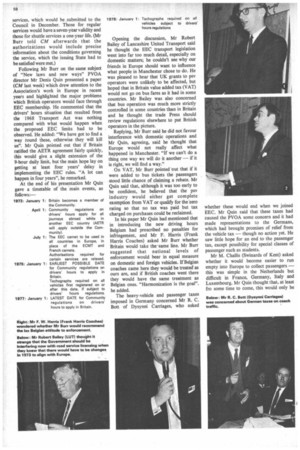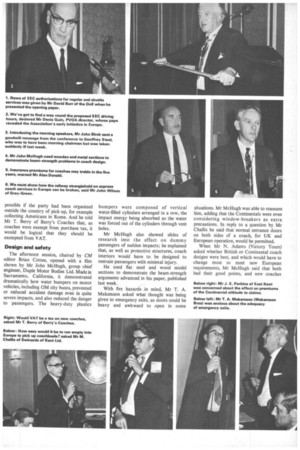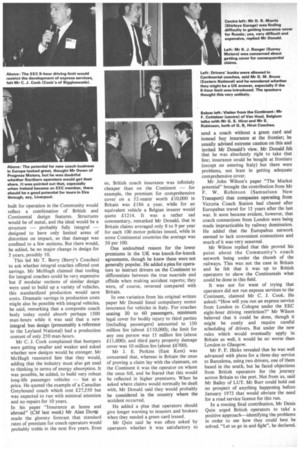CIII/PIFOA Conference 'MAKE TOUR VIEWS EMI IN EUROPE'
Page 59

Page 60

Page 61

Page 62

If you've noticed an error in this article please click here to report it so we can fix it.
REPORT BY DEREK MOSES AND DAVID LOWE PICTURES BY DICK ROSS
IF British operators wished to influence developments in Europe — both in legislation and in operations — then they must make their voices heard, individually and through their associations. That was the principal message of the conference organized jointly last week in London by Commercial Motor and the Passenger Vehicle Operators Association.
Attended by coach and bus proprietors and managers from all over Britain, as well as representatives of the manufacturing industry, the conference — entitled "Europe enters Britain!" — was opened by Mr Anthony Royle, Parliamentary UnderSecretary of State for Foreign and Commonwealth affairs. He declared that there would have been a far greater risk if Britain had decided to stay out of the European Community than the risk it was now taking by going in and by relying on its ability to adjust to European standards in prder to share in European prosperity.
Continuing his theme, Mr Royle — who :ook the place of the Rt. Hon. Geoffrey Rippon, himself involved in negotiations on he Continent — said: "Whether we were in ir out of the Community, its transport .egulations would affect international ransport operators in this country just the :ame. Far better surely to have a seat on the central board' and make sure that full iccount is taken of British ideas and nterests", he declared.
"Think of the inconvenience, and nconvenience means expense, which could le avoided if we agree on common tandards. In the transport sector above all would be self-delusion to imagine that 50 million of us could ignore standards established by 200 million of our closest neighbours", he continued.
Mr Royle also said that the Government was convinced that the enlargement of the Community would lead to an increase in trade between member countries and between the enlarged Community and associate members of it. This conviction was one major reason for the decision to apply for membership. It was borne out by the experience of the existing Six, whose trade between themselves increased by 531 per cent between 1958-1970, while British trade with the Six increased by only 213 per cent over the same period.
One day, under a common transport policy, it would be possible for operators to carry passengers on international journeys anywhere within the Community on any type of service under one licence and registration and carrying only a single travel document, he declared.
Mr Royle admitted that there would be some "short-term problems of adjustment" to certain aspects of existing EEC law, such as the rules on driving hours, rest periods and crew requirements. On two regulations — driving hours and tachographs — they were still negotiating transitional periods. Whatever deferments Britain secured, we should eventually have to face up to the transport regulations, like the other member countries, he added.
Entry into Europe was not a novel situation for those operators who were already there and had, for many years, been running tours to the Continent. Nor was it a novel situation for the PVOA who had
A seat on the "central board" will make sure that full account is taken of British ideas and interests, Mr Anthony Boyle told delegates when he opened the conference. On the platform beside him, representing the joint sponsors, are Mr L. F. Bowen, PVOA National Chairman (centre) and Brian Cottee, Editor of Commercial Motor.
maintained close links with the International Road Transport Union and had kept its members informed of the opportunities and developments in the European Community, he said.
"This Conference demonstrates a willingness to get down to the tasks ahead and the PVOA and Commercial Motor are to be congratulated for arranging it. I am confident that we and they will achieve the results they deserve", he concluded.
For many of the delegates the Conference obviously provided the first realization of the full significance of Britain's impending move into the EEC — to some, indeed, the first real appreciation that the regulations made in Brussels will apply to services operating entirely in this country as well as those on the Continent.
Any doubts on this score were dispelled by the first paper (CM last week) in which Mr David Burr, assistant secretary, Department of the Environment, examined the new laws which will affect psv operators when we enter the EEC.
Mr Burr confirmed that new draft regulations concerning regular and shuttle services (in effect, stage carriage and express) had now been agreed by the EEC Council of Ministers. The EEC Commission, he said, was now preparing models of the authorizations for these services, which would be submitted to the Council in December. Those for regular services would have a seven-year validity and those for shuttle services a one-year life. (Mr Burr told CM afterwards that the authorizations would include precise information about the conditions governing the service, which the issuing State had to be satisfied were met.) Following Mr Burr on the same subject of "New laws and new ways" PVOA director Mr Denis Quin presented a paper (CM last week) which drew attention to the Association's work in Europe in recent years and highlighted the major problems which British operators would face through EEC membership. He commented that the drivers' hours situation that resulted from the 1968 Transport Act was nothing compared with what would happen when the proposed EEC limits had to be observed. He added: "We have got to find a way round these, otherwise they will kill us". Mr Quin pointed out that if Britain ratified the AETR agreement fairly quickly, this would give a slight extension of the 9-hour daily limit, but the main hope lay on getting at least four years' delay in implementing the EEC rules. "A lot can happen in four years", he remarked.
At the end of his presentation Mr Quin gave a timetable of the main events, as follows: 1973; January 1: Britain becomes a member of the Community.
April 1 Community regulations on drivers hours apply for all journeys abroad while in another EEC country (AETR will apply outside the Community).
July 1: The EEC carnet to be used in all countries in Europe, in place of the ECMT and French carnets, Authorisations required for certain services are relaxed.
1975: January 1: EARLIEST POSSIBLE DATE for Community regulations on drivers' hours to apply in Britain.
Tachographs required on all vehicles first registered on or after this date, if subject to drivers' hours regulations.
1977: January 1: LATEST DATE for Community regulations on drivers' hours to apply in Britain. 1979: January 1: Tachographs required on all vehicles subject to drivers' hours regulations
Opening the discussion, Mr Robert Bailey of Lancashire United Transport said he thought the EEC transport legislation went into far too much detail, especially on domestic matters; he couldn't see why our friends in Europe should want to influence what people in Manchester chose to do. He was pleased to hear that UK grants to psv operators were unlikely to be affected, but hoped that in Britain value added tax (VAT) would not go on bus fares as it had in some countries. Mr Bailey was also concerned that bus operation was much more strictly controlled in some countries than in Britain and he thought the trade Press should review regulations elsewhere to put British operators in the picture.
Replying, Mr Burr said he did not favour interference with domestic operations and Mr Quin, agreeing, said he thought that Europe would not really affect what happened in Manchester. "If we can't do a thing one way we will do it another — if it is right, we will find a way."
On VAT, Mr Burr pointed out that if it were added to bus tickets the passengers stood little chance of claiming a rebate. Mr Quin said that, although it was too early to be confident, he believed that the psv industry would either get complete exemption from VAT or qualify for the zero rating so that no tax was paid but tax charged on purchases could be reclaimed.
In his paper Mr Quin had mentioned that in introducing the new driving hours Belgium had prescribed no penalties for infringement, and Mr F. Harris (Frank Harris Coaches) asked Mr Burr whether Britain would take the.same line. Mr Burr suggested that national levels of enforcement would bear in equal measure on domestic and foreign vehicles. If Belgian coaches came here they would be treated as ours are, and if British coaches went there they would have the same treatment as Belgian ones. "Harmonization is the goal". he added.
The heavy-vehicle and passenger taxes imposed in Germany concerned Mr R. C. Bott of Dysynni Carriages, who asked whether these would end when we joined EEC. Mr Quin said that these taxes bad caused the PVOA some concern and it had made representations to the Germans, which had brought promises of relief from the vehicle tax — though no action yet. He saw little hope for an end to the passenger tax, except possibility for special classes of passenger such as students.
Mr M. Challis (Swinards of Kent) asked whether it would become easier to run empty into Europe to collect passengers — this was simple in the Netherlands but difficult in France, Germany, Italy and Luxembourg. Mr Quin thought that, at least fro some time to come, this would only be
possible if the party had been organized outside the country of pick-up. for example collecting Americans in Rome. And he told Mr T. Berry of Berry's Coaches that, as coaches were exempt from purchase tax, it would be logical that they should be exempted from VAT.
Design and safety
The afternoon session, chaired by CM editor Brian Cottee, opened with a film shown by Mr John McHugh, group chief engineer, Duple Motor Bodies Ltd. Markin Sacramento, California, it demonstrated dramatically how water bumpers on motor vehicles, including GM city buses, prevented or reduced accident damage even in quite severe impacts, and also reduced the danger to passengers. The heavy-duty plastics
bumpers were composed of vertical water-filled cylinders arranged in a row, the impact energy being absorbed as the water was forced out of the cylinders through vent holes.
Mr McHugh also showed slides of research into the effect on dummy passengers of sudden impacts; he explained that, as well as protective structures, coach interiors would have to be designed to restrain passengers with minimal injury..
He used flat steel and wood model sections to demonstrate the beam-strength arguments advanced in his paper, published last week.
With fire hazards in mind, Mr T. A. Makemson asked what thought was being given to emergency exits, as doors could be heavy and awkward to open in some situations. Mr McHugh was able to reassure him, adding that the Continentals were even considering window-breakers as extra precautions. In reply to a question by Mr Challis he said that normal entrance doors on both sides of a coach, for UK and European operation, would be permitted.
When Mr N. Adams (Victory Tours) asked whether British or Continental coach designs were best, and which would have to change most to meet new European requirements, Mr McHugh said that both had their good points, and new coaches built for operation in the Community would reflect a combination of British and Continental design features. Structures would be of metal, and the ideal would be a structure — probably fully integral — designed to have only limited areas of distortion on impact, so that damage was confined to a few sections. But there would, he added, be no major change in design for 5 years, possibly 10.
This led Mr T. Berry (Berry's Coaches) to ask whether integral coaches offered cost savings. Mr McHugh claimed that tooling for integral coaches could be very expensive but if modular sections of similar design were used to build up a variety of vehicles, this standardized production would save costs. Dramatic savings in production costs might also be possible with integral vehicles, he said, remarking that a composite coach body today could absorb perhaps 1500 man-hours while it was said that a new integral bus design (presumably a reference to the Leyland National) had a production content of only 250 man-hours.
Mr C. J. Cook complained that bumpers were getting smaller and weaker and asked whether new designs would be stronger. Mr McHugh reassured him that they would, adding that the industry must also get used to thinking in terms of energy absorption. It was possible, he added, to build very robust long-life passenger vehicles — but at a price. He quoted the example of a Canadian Greyhound coach which cost £27,550 but was expected to run with minimal attention and no repairs for 10 years.
In his paper "Insurance at home and 'abroad" (CM last week) Mr Alan Done) made the gloomy forecast that standard rates of premium for coach operators would probably treble in the next five years. Even so, British coach insurance was infinitely cheaper than on the Continent — for example, the premium for comprehensive cover on a 52-seater worth £10,000 in Britain was £186 a year, while for an equivalent vehicle a Belgian insurer would quote £1214. It was a rather sad commentary, remarked Mr Donald, that in Britain claims averaged only 8 to 9 per year for each 100 motor policies issued, while in some Continental countries the average was 50 per 100.
One undoubted reason for the lower premiums in the UK was knock-for-knock agreements, though he knew these were not generally popular. He added a plea for operators to instruct drivers on the Continent to differentiate between the true nearside and offside when making accident reports; they were, of course, reversed compared with Britain.
In one variation from his original written paper Mr Donald listed compulsory motor insurance for vehicles in Italy. For coaches seating 30 to 60 passengers, minimum legal cover for bodily injury to third parties (including passengers) amounted to 150 million lire (about L110,000); the limit for any one person was 15 million lire (about £11,000); and third party property damage cover was 10 million lire (about L6700).
Mr J. E. Perkins (East Kent) was concerned that, whereas in Britain the onus of proving a claim lay with the claimant, on the Continent it was the operator on whom the onus fell, and he feared that this would be reflected in higher premiums. When he asked where claims would normally be dealt with, Mr Donald said they would probably be considered in the country where the accident occurred.
He added a plea that operators should give longer warning to insurers and brokers when they needed a green card issued.
Mr Quin said he was often asked by operators whether it was satisfactory to send a coach without a green card and instead buy insurance at the frontier; he usually advised extreme caution on this and invited Mr Donald's view. Mr Donald felt that he was absolutely right to take that line; insurance could be bought at frontiers (except on entering Italy) but there were problems, not least in getting adequate corn prehensive cover.
Mr John Wilson's paper "The Market potential" brought the contribution from Mr F. W. Robinson (Samuelson New Transport) that companies operating from Victoria Coach Station had chased after Europabus travel for 15 years after the last war. It soon became evident, however, that coach connections from London were being made impracticable by railway domination. He added that the Europabus network seemed to lack convenient connections and much of it was very seasonal.
Mr Wilson replied that this proved his point about the Community's coach network being under the thumb of the railways. This was. not the case in Britain and he felt that it was up to British operators to show the Continentals what could be done in this field.
It was not for want of trying that operators did not run express services to the Continent, claimed Mr C. J. Cook. He asked: "How will you run an express service from London to Cologne under the EEC eight-hour driving restriction?" Mr Wilson believed that it could be done, though it might be costly and require careful scheduling of drivers. But under the new rules which would eventually apply in. Britain as well, it would be no worse than London to Glasgow.
Mr P. F. Hicks revealed that he was well advanced with plans for a three-day service to Barcelona, using two drivers, one of them based in the south, but he faced objections from British operators for the journey across Britain to the port. Not from us, said Mr Bailey of LUT. Mr Burr could hold out no prospect of anything happening before January 1973 that would obviate the need for a road service licence for this run.
In a rousing final contribution, Mr Denis Quin urged British operators to take a positive approach—identifying the problems in order to see how they could best be solved. "Let us go in and fight", he declared.










































































































































































































